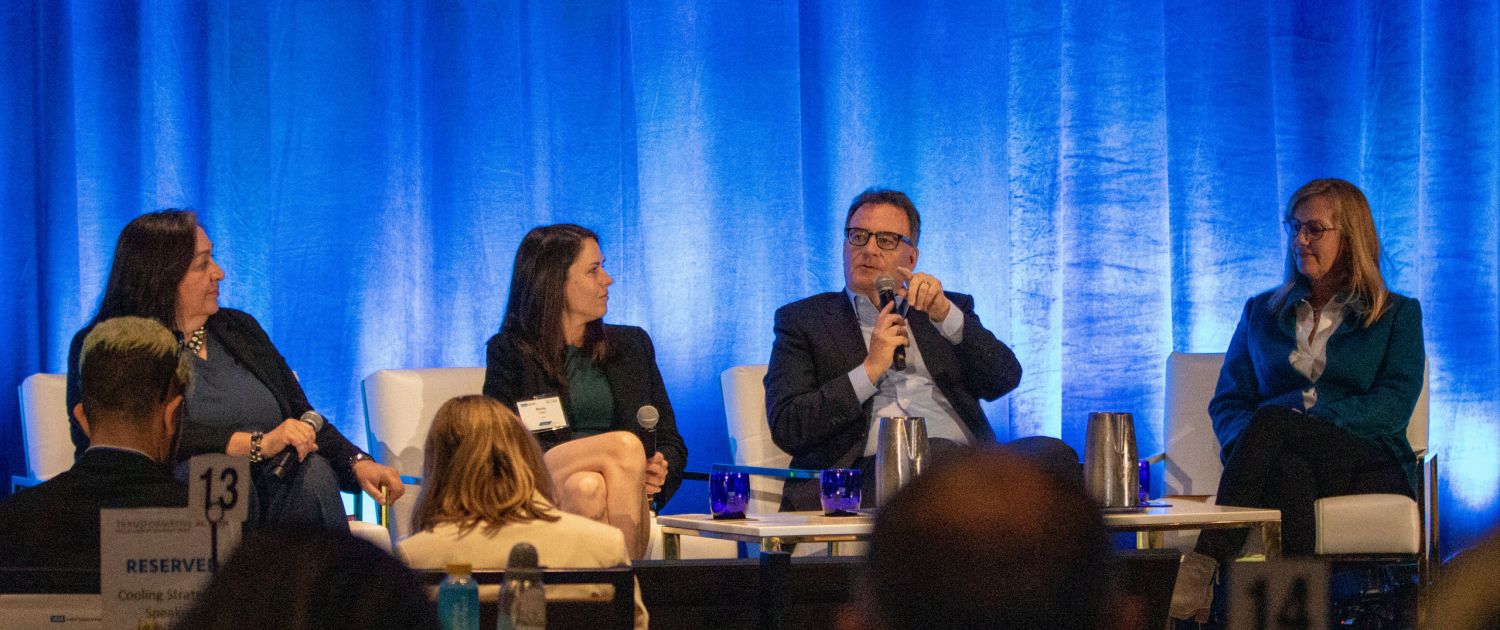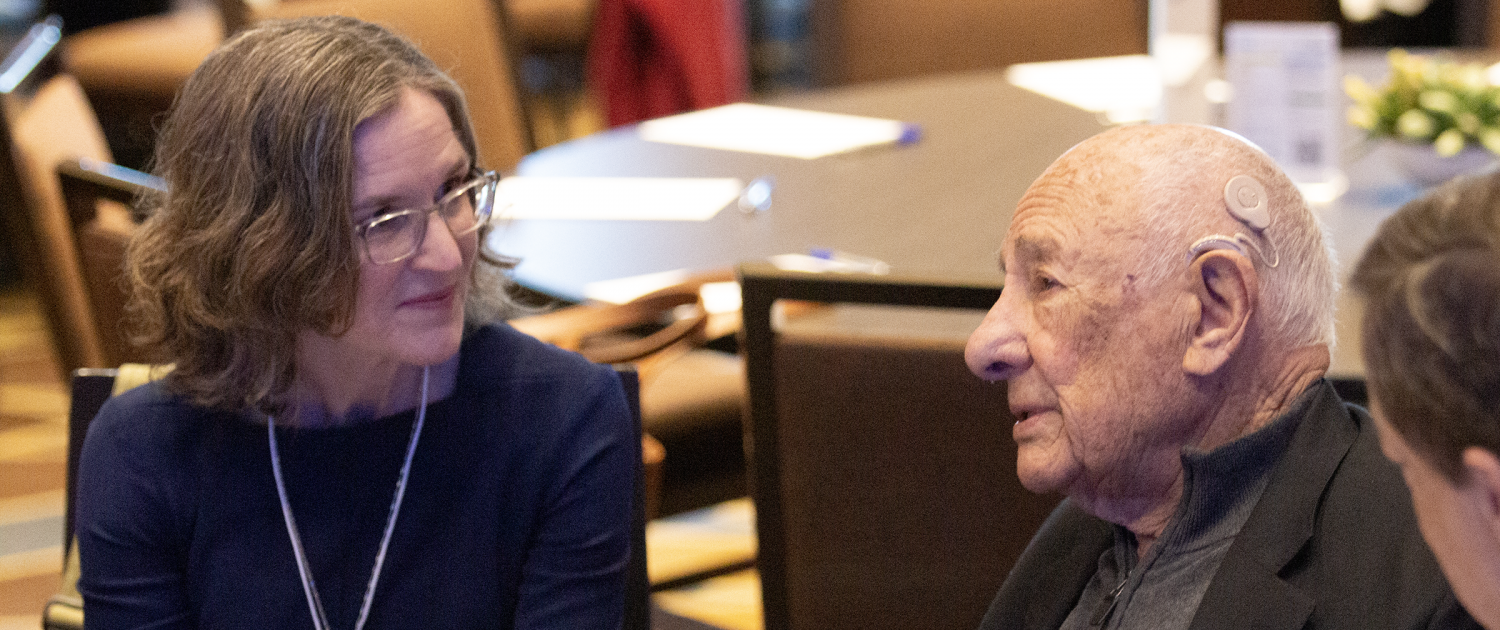Climate resilience panels drew crowds at UCLA Luskin Summit
The Luskin Center for Innovation and civic partners shared lessons on cooling strategies and community-led climate action
What can we do to make communities more climate resilient?
This question and more was discussed at the Luskin Center for Innovation-led climate resilience panel conversations at the 2024 UCLA Luskin Summit: Transformative Action. This annual conference, held by the Luskin School of Public Affairs, convened about 300 scholars, civic leaders, community partners, and the philanthropic community to learn about and discuss research-informed strategies to address the most pressing problems affecting the Los Angeles region.
Los Angeles Mayor Karen Bass provided the Summit’s keynote in conversation with Jacqueline Waggoner of Enterprise Community Partners Inc. The Mayor highlighted the need for multiple housing solutions and the value of research on issues including climate resilience. Aptly, the Luskin Center for Innovation organized and moderated two expert panel discussions about climate resiliency.
The first panel – Cooling Strategies for an Active L.A. in a Warming World – was facilitated by Edith de Guzman and included Becky Dale, Jonathan Parfrey, Sharon Sand, and Marta Segura (see below for details). They discussed how to protect schoolchildren, athletes, and all those who are active outside and vulnerable to the effects of extreme heat. The conversation was especially pertinent as the L.A. region prepares to host the 2028 Olympic and Paralympic Games. The experts talked about how we can accelerate shade and other cooling solutions, especially for those who live, work, or play in the region’s many hot spots and shade deserts.
Learn about the panelists:
- Edith de Guzman, Water Equity and Adaptation Policy Specialist at the Luskin Center for Innovation, moderated this conversation. She is an interdisciplinary researcher working to understand and address the impacts of climate change in underrepresented communities.
- Becky Dale is the Vice President for Sustainability at LA28; an organization focused on creating an unparalleled Olympic and Paralympic experience for athletes, fans, and our local community. She manages the development and execution of strategic sustainability plans for the event.
- Jonathan Parfrey is the Executive Director of Climate Resolve, which develops climate policy and builds community-driven projects in low-income areas of Los Angeles. He is also a member of the LA28 Olympics and Paralympic Games Sustainability Working Group.
- Sharon Sand, Sr. Public Grants Program Manager at the Trust for Public Land, is focused on climate change adaptation, protecting biodiversity, and providing equitable access to nature, parks, and green schoolyards.
- Marta Segura is the founding Chief Heat Officer and Director of Climate Emergency Mobilization for the City of Los Angeles. She integrates art, multiple languages, community engagement, equity, and health as priorities in addressing extreme heat and the climate crisis to deliver equitable solutions.
The second panel – Transformative Climate Communities in the LA Region – was moderated by Megan Mullin and included Zahirah Mann, Randall Winston, and Alvaro Sanchez. They discussed how some of the world’s most holistic, groundbreaking investments in community-led climate action are taking place in Southern California. Much can be learned from these inspiring stories — and their Luskin Center for Innovation-led evaluations — to inform and scale climate action in other communities.
Learn about the experts:
- Megan Mullin, Faculty Director at the Luskin Center for Innovation and Professor of Public Policy, facilitated this panel. As a political scientist, her research examines how coordination problems, accountability failure, and inequality in environmental risks and benefits shape political responses to environmental change.
- Zahirah Mann is President and CEO of SLATE-Z; a collective impact effort addressing economic revitalization and environmental sustainability in South Los Angeles. SLATE-Z collaborates with 100 local partners and is part of a national Promise Zone Network working to transform 22 high-poverty communities.
- Randall Winston, Deputy Mayor of Infrastructure for the City of Los Angeles, leads the city’s infrastructure policy and investments in public works and transportation. Previously, under his leadership at the California Strategic Growth Council, the agency invested over $1.3 billion in transit-oriented affordable housing, land conservation, and capacity building in the most under-resourced communities in California.
- Alvaro Sanchez, Vice President of Policy at The Greenlining Institute, has helped shape over $5.5 billion in California Climate Investments targeted at priority communities. He also helped establish the Transformative Climate Communities and Regional Climate Collaboratives state programs via legislation.
In addition to these interesting conversations, other panel discussions were guided by research conducted by the Institute of Transportation Studies, the Lewis Center for Regional Policy Studies, and the Latino Policy and Politics Institute.
To learn more about the Mayor’s keynote address, other breakout group discussions, and the results of the Los Angeles Quality of Life Index, see the UCLA Luskin School of Public Affairs’ news story. For photos of the event, click here.
To learn more about the Luskin Center for Innovation’s research on climate resilience, visit our website.











